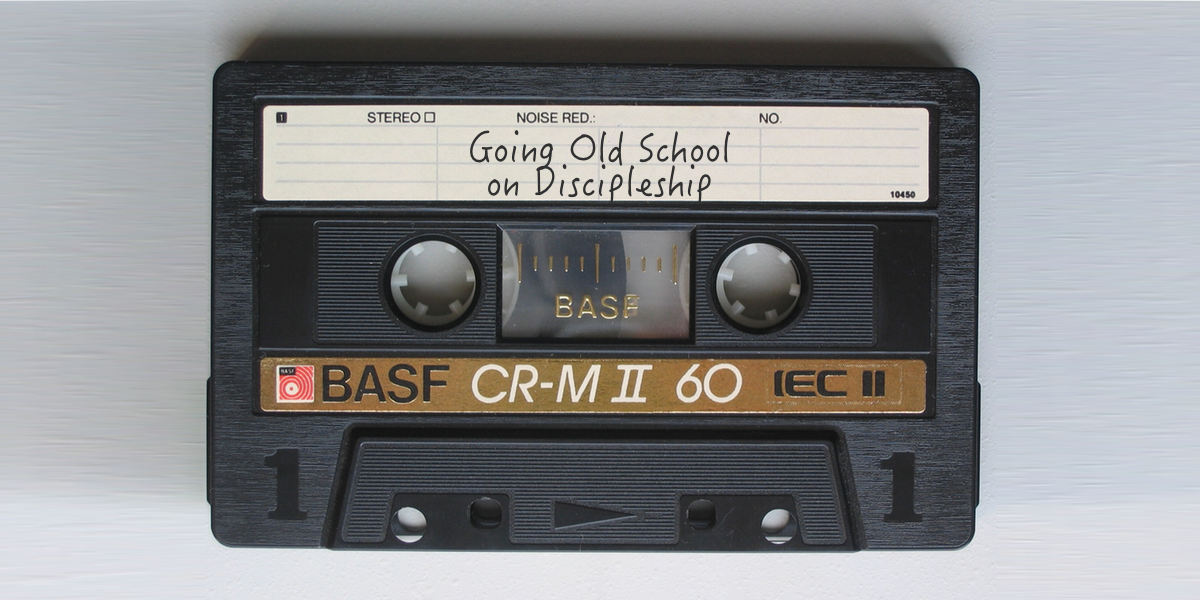Discipleship is one of those words that is…well…let’s be honest…worn out! It triggers so many things for so many people. For example, I was recently in a conversation with someone who, after I used the word discipleship, asked why I still used that term. He said “Why don’t you just use the term ‘spiritual formation.’” To be honest, sometimes I have thought about abandoning the word discipleship. It has been so diluted and deformed that it means almost anything to everyone. However, I am committed to this word because it is consistently used in the text of scripture, and etymologically (big word, sorry) it provides an entry point for us to discover what it means to be a disciple of Jesus.
Going Old School on Discipleship
In order to capture what this word discipleship means, we have to go all the way back to Jesus in the gospels. When Jesus invited the 12 into a discipling relationship, it didn’t require much explanation. This kind of relationship was already a part of the Jewish culture and society. They pretty much knew what kind of relationship they were being invited into. It was a leader-follower relationship where the rabbi would transfer everything he had to his disciples. When I say everything, I mean everything. This was not just a teacher-student relationship. The approach to learning was comprehensive. It primarily revolved around three areas:
- Comprehension– what the rabbi knew
- Character – who the rabbi was
- Competence – what the rabbi could do
Ray Vander Laan captures this comprehensive approach to learning in the rabbi-disciple relationship when he uses the phrase “Let the dust of your rabbi be upon you.” Disciples would follow their rabbi around so closely that the dust kicked up from the rabbi’s sandals would land on the disciple’s garments. This approach to developmental relationships is not something Jesus invented. There is nothing inherently unique about this style of training that belongs exclusively to Jesus. It was actually woven into the very fabric of their culture within second temple Judaism.
Bridging the Gap
Today, however, we live in a different culture and society where these kinds of relationships are not very common. Learning is primarily approached through the more one dimensional approach of comprehending new information. As such, if you invite someone to “come follow” you and be your disciple, you would likely get some strange looks, as well as a few questions. Maybe something along the lines of “Do I want to be your disciple? What are you, a cult leader?” Or “Do I want to be discipled by you? Who do you think you are? Jesus or something?” Because we live in a culture where discipling relationships are not the norm, it requires some tactfulness in how we bridge this cultural and historical gap between Jesus’ day and our day. It essentially comes down to how you “package the invitation.”
Packaging the Invitation
Some of the difficulties in forming discipling relationships can also be traced to the kind of language we use when talking about it. You can’t just walk up to someone and say “I want to disciple you.” That’s just plain weird. The word disciple is likely unfamiliar to most people and could create too much confusion and suspicion on the front end of the relationship. You have to explain what kind of relationship you are inviting people into.
Sometimes it’s more appropriate to use words and phrases that people will readily understand.
Instead of saying: “I would like to disciple you”
You could possibly say something like this: “I have a process that I walk people through that helps them become better followers of Jesus. Would you be interested in walking through that process with me?”
Or something like this:
“I have found a way of following Jesus that has been really helpful to me. I would like to invite you into a relationship where I share this way of following Jesus with you. Would you be interested in walking with me for a season?”
In both examples, you are inviting someone into a discipling relationship, but the way in which you are inviting them is different.
Old School is the New School
Jesus himself was sensitive to the language he used when working with his disciples. For example, even though Jesus was the Christ, he hardly ever used this language to describe himself because he knew it was a loaded term filled with certain political and cultural expectations that were misaligned with his calling. However, notice that he eventually allowed them to use this language, but only with corrective teaching as to its actual meaning.
I still think we need to hold on to the language of discipleship, being disciples and making disciples. Sometimes language is all we have to initiate efforts of change. Holding on to these words, but more importantly, how they are defined and demonstrated in the life of Jesus, is crucial for us being able to discern our vocation as disciples of “Jesus the disciple maker.” Sometimes old school is the new school. After all, how many people do you know of who are being and making disciples like Jesus? It’s hard to improve on what Jesus has done.
“Let’s Plant a V3 Church in my Neighborhood”
Share on Facebook!
Tweet This!
Share this Post

